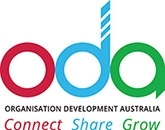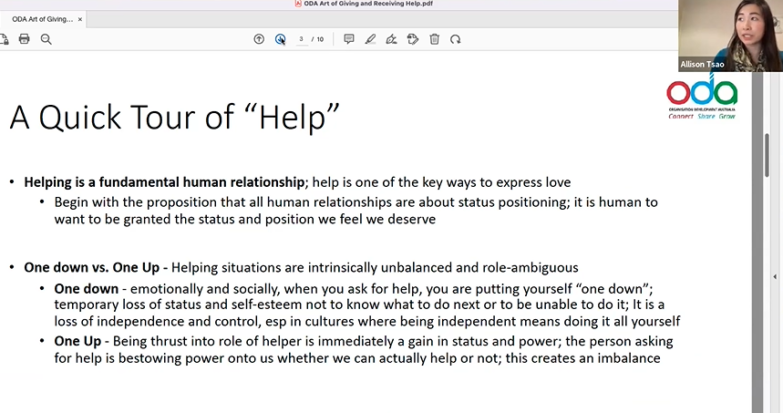Our May event was a session that focused on giving and receiving help – something that seems so simple yet is really difficult to do well. Facilitated by ODA Leadership Group member Allison Tsao and ODA President Danielle Jacobson, the event aimed at answering the questions: how do we offer help? how is our help received? when is our help really helpful?
The ODA events of 2023 are each aligned to a different OD competency of the Global OD Competency Framework, and this time around the event focused on building our competency of “Trusted Advisor”. As OD practitioners, we all have people coming to us to look for some sort of help and we build trusting relationships with them so that we can advise or help steer the organisation in a more productive path.
The session was highly interactive, exploratory and practical. Drawing from the impactful work of Ed Schein, Allison explained the concept of status positioning – of one down and one up – and where we stand as we receive or give help, and the concept of helping situations being intrinsically unbalanced and ambiguous. We learnt that in the context of OD. the client is one down = vulnerable, and the helper is one up = powerful. That led us to the question, when we are in a place of power, how do we use it responsibly?
We had been asked to bring a challenge that we were facing that we’d like to receive help on, and we were able to practice some structures that supported both giving and receiving help.
We were sorted into trios and asked to assume roles (1 person is the client, 1 is the coach, and 1 is the witness). During the activity termed “quiet presence”, the “client” talked about the challenge they were facing, and “coach” had to practice compassionate listening. At the debrief, we were asked about our experience, how it was helpful and where we might apply this type of help. During the next activity, “Guided Discovery“, our roles were switched, and the coach interviewed the client, with the witness taking notes. For the final activity, “Loving Provacation“, instead of a trio, one person assumed the role of the client and had to explain the challenge they were currently experiencing as an OD practitioner, and the rest of us, who were the consultants, had a discussion on the challenge presented.
Danielle encouraged us to reflect on our key takeaways from these activities and how we may apply it in our OD practice.
Note: Members can log in and watch the video of the session here.
Not a member? Sign up!

